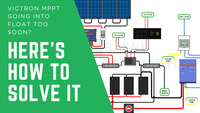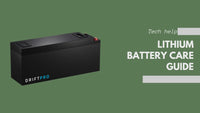Lithium leisure batteries are an increasingly popular choice for campervans, offering excellent efficiency, a longer lifespan, and lighter weight compared to traditional AGM batteries. Proper care and maintenance are essential to maximise their performance and longevity. This guide will cover everything you need to know about storing, charging, and isolating your lithium batteries, ensuring you get the best out of your campervan's power system.
Why Choose Lithium Leisure Batteries?
Lithium batteries have become almost the go to choice for campervans, and for good reason:
- Lightweight: Easier to handle and install, reducing overall van weight.
- Efficient: They provide more usable power than lead-acid alternatives, delivering higher efficiency.
- High Power Output: Can handle high discharge loads, often up to 300A, perfect for running heavy appliances like induction cookers and air fryers.
- Longevity: With proper care, lithium leisure batteries can last up to 10 years or more.
- Fast Charging: Recharge times are quicker, giving you more freedom on the road.
Storing Lithium Leisure Batteries
Storing your lithium leisure battery correctly is crucial to maintaining its long-term health. Here are some essential steps:
- Charge to Optimal Level: Store your batteries at around 50%-60% state of charge (SOC). This reduces stress on the battery and maximizes its lifespan.
- Temperature Control: This one is a lot harder in a campervan, but in a perfect world, store your battery in a cool, dry location, avoiding extreme temperatures. Ideal storage conditions are between 10°C and 25°C.
- Periodic Checks: Every few months, check the battery’s charge. If it has dropped, recharge it to 50%-60% SOC to prevent deep discharges.
Charging Your Lithium Leisure Battery
Following proper charging procedures is key to extending your lithium leisure battery's life:
- Use a Lithium-Compatible Charger: Always use a charger designed for lithium batteries, as these regulate voltage and current effectively (our Victron chargers are perfect for this).
- Avoid Overcharging: While lithium batteries have built-in Battery Management Systems (BMS) to prevent overcharging, always use chargers with overcharge protection for added safety.
- Balance Charging: Occasionally perform a balance charge to ensure all cells are equally charged. This maintains your battery’s efficiency and health.
Solar Charging and PV Isolation for Lithium Batteries
When charging your lithium leisure batteries with solar panels, isolation and regulation are crucial:
- MPPT Charge Controller: Always install an MPPT charge controller between your solar panels and battery to regulate incoming voltage and prevent overcharging. Our Victron Smartsolar controllers come with the Victron Connect app to help you monitor your system in real-time.
- Monitor Charge Levels: Regularly check your charge levels to ensure the system is operating smoothly. Victron’s app makes this easy and reliable.
- Disconnect When Idle: If your campervan will be unused for an extended period, disconnect the solar panels using a PV isolator switch (available in our online shop) to avoid unwanted battery drain or overcharging.
General Tips for Lithium Battery Care
- Avoid Deep Discharges: Repeatedly dropping below 20% SOC can shorten your battery’s life, so recharge early to avoid damage.
- Regular Inspections: Frequently check your battery and its connections for any signs of wear or damage.
- Clean Connections: Keep battery terminals and connections clean to prevent corrosion, which can reduce performance.
Conclusion
Proper care for your lithium leisure battery ensures you get the best out of your campervan’s power system, providing reliable energy for many years to come. Follow these guidelines for storing, charging, and isolating your battery to maximize its performance and lifespan.
For more information or to explore our range of lithium leisure batteries and accessories, visit our online shop or contact our team.





